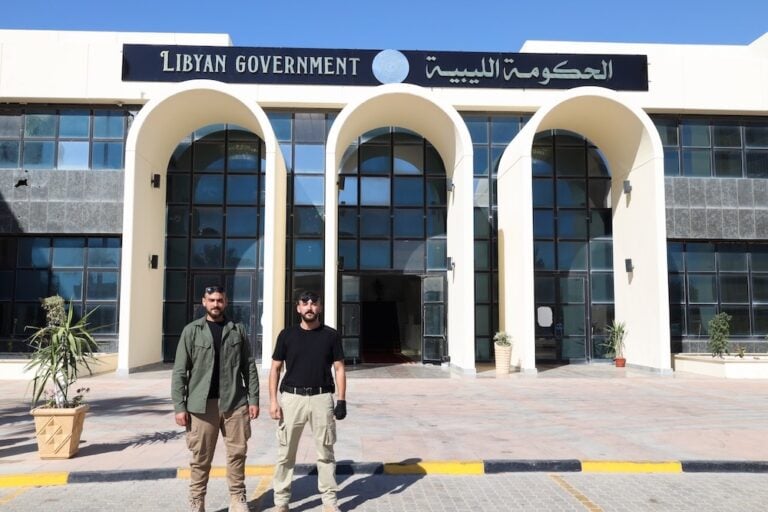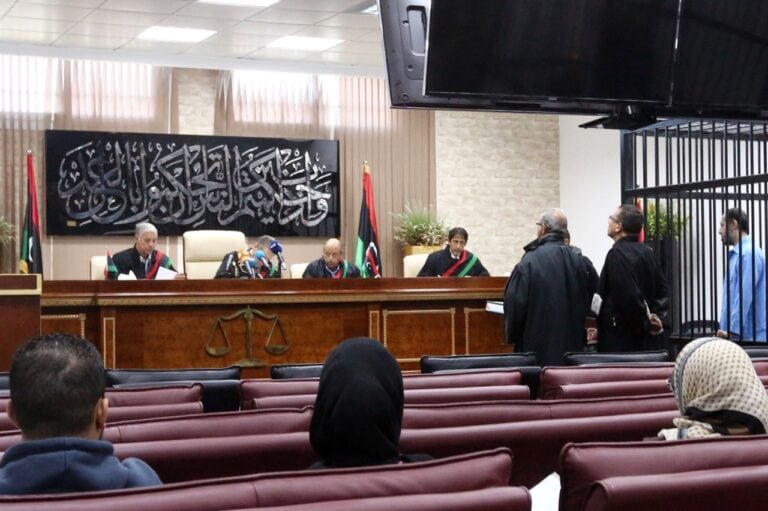The Saraya Swehli militia, commanded by Faraj Swehli, detained Nicholas Davies-Jones and Gareth Montgomery-Johnson, both British citizens, in Tripoli early on February 21, 2012, along with three Libyans.
(Human Rights Watch/IFEX) – Tripoli, February 27, 2012 – A Tripoli-based militia from Misrata should immediately transfer to the Libyan government two illegally detained British journalists and the three Libyans who were traveling with them, Human Rights Watch said today. The men are among thousands of people held illegally by militias in Libya.
The Saraya Swehli militia, commanded by Faraj Swehli, detained Nicholas Davies-Jones, 32, and Gareth Montgomery-Johnson, 37, both British citizens, in Tripoli early on February 21, 2012, Human Rights Watch said. The names of the two Libyans with the journalists and the taxi driver detained with them are unknown. The two journalists were freelancers working mostly with the Iranian state-owned Press TV.
“The longer armed groups make arrests and hold prisoners, now including foreign journalists, the harder it becomes to bring these groups under control,” said Sarah Leah Whitson, Middle East and North Africa director at Human Rights Watch. “The militias need to get out of the detention business, and the government should re-double its efforts to take control of all militia detention facilities and treat all unauthorized detention as a crime.”
Thousands of detainees are in dozens of detention facilities in Libya, but the exact numbers remain unknown, Human Rights Watch said. The Justice Ministry has assumed control of about six large facilities across the country, but many others are still run by militias and other groups with informal relationships to the state.
An official at the Saraya Swehli militia told Human Rights Watch that the militia had stopped the two journalists and three Libyans with them because they were driving late at night in Tripoli and taking photographs, which the militia deemed suspicious.
“The time was not suitable,” one militia official told Human Rights Watch.
The militia detained the men at its base at the Girls’ Training Military College in Tripoli because one of the men had a “bad attitude” and because of unspecified problems with the Libyans’ papers, militia officials said. Militia members later accused the two journalists of not having the proper immigration papers to be in Libya.
“If these journalists have immigration problems, then the Justice Ministry and Immigration Department should deal with that, not a self-appointed militia with no legal power to make arrests or hold detainees,” Whitson said.
On February 23 the Interior Ministry asked the Saraya Swehli militia to hand over the two journalists. As of February 26 the militia had refused. Militia officials justified the refusal by saying they lacked confidence in the government.
“This is about the security of the country,” one of them told Human Rights Watch.
The head of the Misrata Military Council, Ramadan Zarmuah, defended the Saraya Swehli militia in a phone call with Human Rights Watch on February 21, contending that militias have the right to make arrests. A National Transitional Council representative from Misrata, Sulaiman Fortia, echoed that position on February 25, claiming the militia was a legitimate government body.
“The [journalists] have been well-looked-after, and they will continue to be well-looked-after,” Fortia said. “This is a government place. This brigade falls under the Ministry of Defense and the Ministry of Interior.”
Officials at the Saraya Swehli militia said a prosecutor at their facility would conduct an investigation. But the Interior Ministry and the General Attorney’s office both told Human Rights Watch that the militia and its “prosecutor” were operating outside their jurisdiction.
The Saraya Swehli militia repeatedly denied Human Rights Watch access to the detainees. Faraj Swehli, the militia commander, denied private access on February 25, despite a signed and stamped letter from the Interior Ministry authorizing Human Rights Watch to visit any prisoner privately. Militia officials had denied Human Rights Watch access on February 21 and 22, despite letters from the National Transitional Council and the Justice Ministry granting access to all detention facilities in the country.
The British government said it has been providing consular services to the detained journalists.
The Saraya Swehli militia has been holding detainees at the Girls’ Military College since at least October 2011. One person with knowledge of the facility from December 2011 said the militia was holding about 60 people at that time, and some of them had been beaten during interrogations.
Human Rights Watch urged the Libyan government to accelerate its efforts to rebuild the criminal justice system. This includes taking over the prisons, centralizing the recording of detainees, and getting investigators, prosecutors, and judges back to work so they can process thousands of detainee cases.
“Faraj Swehli and other commanders need to understand that they are not allowed to act outside the law, even under the banner of security,” Whitson said. “They are undermining the future of Libya as a country ruled by law.”


